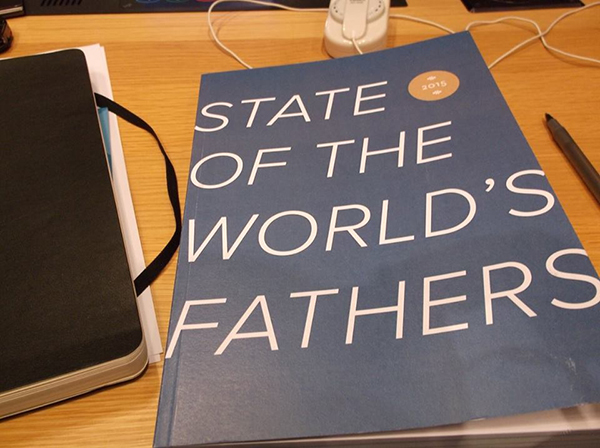
The release of the State of the World’s Fathers report, brought together a cross section of experts and delegates at the New York headquarters of the United Nations on June 16, 2015.
As Father’s Day approaches, 2015 marks a unique milestone for fatherhood around the world because a comprehensive study on the social and economic impacts of fathers such as this has never been conducted — until now.
The result is a 287-page report that touches on a wide range of issues from the economics of care-giving to analysis on gender-based violence and the proven benefits of children having positive male role models.
Perhaps it’s no surprise that cultural concepts about masculinity can have far reaching influence on a country’s development. At their worst, men act as an obstacle to change, stalling much needed progress indefinitely. But at their best, men are significant contributors to things like girls’ education and child development.
Understanding how and why such positive or negative influence takes place is the underlining motivation for the study. For example, key findings in the report detail how lives and livelihoods can be drastically altered by the presence or absence of parental leave, the degree to which care work in the home is shared equally by gender, or by a man’s attitude towards sexual and reproductive health.
These findings have particular relevance to our work at Creative Associates International:
- Approximately 80 percent of men will become biological fathers at some point in their lives, and virtually all men have some connection to children – as relatives, as teachers, as coaches or simply as community members.
- Fathers’ involvement has been linked to higher cognitive development and school achievement, better mental health for boys and girls, and lower rates of delinquency in sons. Studies in multiple countries have shown that father’s interaction is important for the development of empathy and social skills in sons and daughters.
- Women’s household responsibilities and duties have a significant effect on their ability to work outside the home, whether they are senior executives or subsistence farmers. While women’s participation in the paid labor market has been increasing in most of the world, women are still more likely than men to have lower-paid jobs and part-time jobs, to earn less than men do,; and to be self- or family-employed, or to work in the informal sector.
- Women’s unpaid care burden has the greatest impact on the poorest in society for whom additional time and income could make the most difference. In sub-Saharan Africa, 71 percent of the burden of collecting water for households falls on women and girls, who in total spend 40 billion hours a year collecting water, equivalent to a year’s worth of labor by the entire workforce in France.
In short, the State of the World’s Fathers has a lot of key insights to impart to the development field, whether practitioners focus on education, health, gender, or workforce development. At the June release, that significance was unmistakable.
During the summit at UN headquarters, I met an array of people – men hailing from to Kinshasa, women who work in corporate social responsibility and organizers of dads’ activities groups. Together, everyone realized that more can and should be done, but that there had to be a starting point.
This first-of-its-kind study builds on the perspectives of fathers from around the world and strengthens our knowledge on the subject of fatherhood with data-driven research.
In her opening remarks at the reports’ release, Clinton Foundation Vice Chair Chelsea Clinton articulated that this data not only helps measure progress but can also drive progress.
Another speaker made a similar point: “The things that matter are the things you count.”
With that in mind, tracking and analyzing fatherhood going forward can only mean better informed approaches to addressing the needs of men, women, and children globally.
Beyond keynote speeches and panel discussions, the real purpose of this effort is to work in partnership with the substantial research that already exists concerning the wellbeing of women and children. Powered by this information, everyone is better able to thrive and we’re no longer left with an enormous blind spot when it comes to gender in the world.
It’s like a Father’s Day gift for everybody.
To find out more, check out the MenCare website and download the full report on the State of the World’s Fathers.

